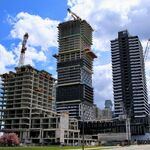Automation Gallery
Superstar
Wow.....what else can this city council think of. just another item to check for on craigs list......TTC 1 year pass cheap 1/2 price.
just another item to check for on craigs list......TTC 1 year pass cheap 1/2 price.
Developers building condos on Toronto transit lines will now have to buy every unit a TTC metropass for a year in order to obtain condominium approval from the city, a policy critics say comes at a high cost and without proof people will use it.
“How does the city know that everyone is going to want or need a metropass?” said Stephen Dupuis, president and chief executive officer of Building Industry and Land Development Association (BILD).
City council voted yesterday in favour of the policy, which Mr. Dupuis said adds a systemic cost of about $1,400 per unit. He said his organization is pro-transit, “but people are going to take transit if it suits their lifestyle.”
Councillor Howard Moscoe, however, believes it “will cause people on transit lines to abandon their cars.”
He pushed the initiative forward, which passed council without debate. The policy states the cost of the metropasses cannot be passed on to the condo buyer.
City staff describe it as a “transportation demand management measure” that is aimed at encouraging transit use and reducing dependency on cars. It applies to condo projects with 20 or more units in areas that “are or will be well-served by transit.” A map shows that includes downtown, from Bathurst Street to the Don Valley Parkway and past Bloor, the central waterfront, and avenues where there are current or planned streetcar and light rail lines.
Mr. Moscoe said he used to delay developments, demanding the metropass policy as a condition of approval. Some builders embraced the idea, while others fought it to the Ontario Municipal Board.
“It turned out to be a great marketing tool for the condo builder,” he said. “Besides, it doesn’t cost the builder of the condo anything up front. He can buy the transit pass in bulk from the TTC at a 12% discount, and get a 16% writeoff on his income tax from the federal government for transit passes. So it’s a win win for everybody,” he said.
Mr. Moscoe said the idea is not really to generate revenue, since presumably some people in the building would have bought passes on their own, but to get people thinking about public transit.
“I think we’re going to get awards for this all over North America,” he said.
And he would like to see the plan expand into a sliding scale that would allow a builder to construct fewer parking spaces, if the company buys metropasses for more years.
Mr. Dupuis noted zoning bylaws stipulate 1.2 spaces per unit, which creates extraordinary expense for some of the larger buildings that have to dig several floors underground.
“The city is in a funny position because they set the parking standards and they’re always concerned that there be enough, if not more than enough parking, so people don’t park on the street,” said Mr. Dupuis.
“This is found money for the TTC,” he said of the plan. Or a treat for a condo dweller who can simply resell the pass.
http://network.nationalpost.com/np/...s-to-buy-annual-metropass-for-every-unit.aspx
Developers building condos on Toronto transit lines will now have to buy every unit a TTC metropass for a year in order to obtain condominium approval from the city, a policy critics say comes at a high cost and without proof people will use it.
“How does the city know that everyone is going to want or need a metropass?” said Stephen Dupuis, president and chief executive officer of Building Industry and Land Development Association (BILD).
City council voted yesterday in favour of the policy, which Mr. Dupuis said adds a systemic cost of about $1,400 per unit. He said his organization is pro-transit, “but people are going to take transit if it suits their lifestyle.”
Councillor Howard Moscoe, however, believes it “will cause people on transit lines to abandon their cars.”
He pushed the initiative forward, which passed council without debate. The policy states the cost of the metropasses cannot be passed on to the condo buyer.
City staff describe it as a “transportation demand management measure” that is aimed at encouraging transit use and reducing dependency on cars. It applies to condo projects with 20 or more units in areas that “are or will be well-served by transit.” A map shows that includes downtown, from Bathurst Street to the Don Valley Parkway and past Bloor, the central waterfront, and avenues where there are current or planned streetcar and light rail lines.
Mr. Moscoe said he used to delay developments, demanding the metropass policy as a condition of approval. Some builders embraced the idea, while others fought it to the Ontario Municipal Board.
“It turned out to be a great marketing tool for the condo builder,” he said. “Besides, it doesn’t cost the builder of the condo anything up front. He can buy the transit pass in bulk from the TTC at a 12% discount, and get a 16% writeoff on his income tax from the federal government for transit passes. So it’s a win win for everybody,” he said.
Mr. Moscoe said the idea is not really to generate revenue, since presumably some people in the building would have bought passes on their own, but to get people thinking about public transit.
“I think we’re going to get awards for this all over North America,” he said.
And he would like to see the plan expand into a sliding scale that would allow a builder to construct fewer parking spaces, if the company buys metropasses for more years.
Mr. Dupuis noted zoning bylaws stipulate 1.2 spaces per unit, which creates extraordinary expense for some of the larger buildings that have to dig several floors underground.
“The city is in a funny position because they set the parking standards and they’re always concerned that there be enough, if not more than enough parking, so people don’t park on the street,” said Mr. Dupuis.
“This is found money for the TTC,” he said of the plan. Or a treat for a condo dweller who can simply resell the pass.
http://network.nationalpost.com/np/...s-to-buy-annual-metropass-for-every-unit.aspx





